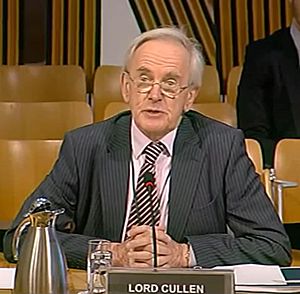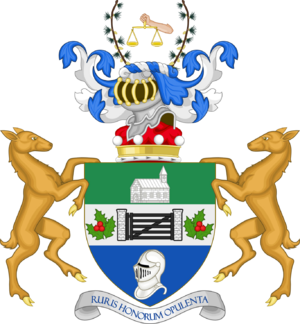William Cullen, Baron Cullen of Whitekirk facts for kids
Quick facts for kids
The Lord Cullen of Whitekirk
|
|
|---|---|

Cullen in 2015
|
|
| Lord Justice General and Lord President of the Court of Session |
|
| In office 2002–2005 |
|
| Monarch | Elizabeth II |
| Preceded by | Lord Rodger |
| Succeeded by | Lord Hamilton |
| Lord Justice Clerk | |
| In office 1997–2002 |
|
| Preceded by | Lord Ross |
| Succeeded by | Lord Gill |
| Personal details | |
| Born |
William Douglas Cullen
18 November 1935 |
| Nationality | Scottish |
| Spouse | Rosamond Mary Downer |
| Alma mater | University of St Andrews, University of Edinburgh |
| Profession | Advocate |
William Douglas Cullen, Baron Cullen of Whitekirk (born 18 November 1935) was a very important judge in Scotland. He held some of the highest legal positions in the country. He was known for leading several major public investigations.
Contents
Early Life and Education
William Douglas Cullen went to school at the High School of Dundee. He then studied at two universities: St Andrews and Edinburgh. After his studies, he became an advocate in 1962. An advocate is a lawyer who speaks for people in court.
Early Legal Career
From 1970 to 1973, he worked for Her Majesty's Customs and Excise. In 1973, he became a Queen's Counsel. This is a special title for experienced lawyers. He also worked as an Advocate Depute from 1978 to 1981. An Advocate Depute is a lawyer who helps the government with court cases. From 1984 to 1986, he led a group called the Cockburn Association. This group works to protect old buildings and areas in Edinburgh.
Judicial Career and Key Inquiries
Lord Cullen became a judge in 1985. He was given the title Lord Cullen. He served as a Senator of the College of Justice. This means he was a judge in Scotland's highest courts.
Leading Public Inquiries
Lord Cullen led several important public investigations:
- From 1988 to 1990, he investigated the Piper Alpha disaster. This was a major accident on an oil platform.
- In 1996, he led the inquiry into the shootings at Dunblane Primary School.
- In October 1999, he was chosen to lead the Ladbroke Grove Rail Inquiry. This inquiry looked into a serious train accident.
High Judicial Roles
From 1997 to 2002, he was the Lord Justice Clerk. This is the second highest judge in Scotland. In 2002, he became the Lord Justice General and Lord President of the Court of Session. These are the highest judicial positions in Scotland.
Lockerbie Appeal
In March 2002, Lord Cullen led a group of five judges. They heard the appeal of Abdelbaset al-Megrahi. This appeal was about his conviction for the 1988 Lockerbie bombing of Pan Am Flight 103. The appeal was not successful.
Retirement
Lord Cullen announced his plan to retire in July 2005. He officially retired in November 2005. Lord Hamilton took over his roles as Lord Justice General and Lord President.
Honours and Recognitions
On 17 June 2003, William Cullen was made a life peer. This means he became a member of the House of Lords for life. He was known as Baron Cullen of Whitekirk. He retired from the House of Lords in 2019.
Other Achievements
- In 2005, he became the president of the Saltire Society. This society promotes Scottish culture.
- On 30 November 2007, he was appointed a Knight of the Thistle. This is a very high honour in Scotland. Queen Elizabeth II knighted him in Edinburgh in 2008.
- In 2009, he became the chancellor of Abertay University in Dundee. He held this position for ten years.
- He was made an Honorary Fellow of the Royal Academy of Engineering in 1995.
- He also received an Honorary Doctorate from Heriot-Watt University in 1995.
- In 1997, he became a member of the Privy Council of the United Kingdom. This is a group of senior advisors to the King.
 | Anna J. Cooper |
 | Mary McLeod Bethune |
 | Lillie Mae Bradford |


